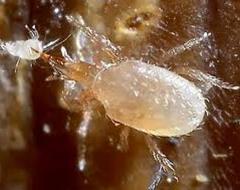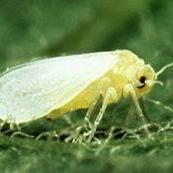Hypoaspis Hypoaspis miles
Hypoaspis miles (Hypoaspis) is a soil dwelling mite which feeds on small arthropods and nematodes. It is harmless to plants and people. It gives excellent control of fungus gnats when used preventatively, and helps to control thrips by attacking thrips pupae in the soil.
Description and biology
The adult mite is brown and about 1mm long. Young stages (a larval stage and two nymphal stages) are pale and smaller. The optimum temperature for development is 25°C. At this temperature development takes about two weeks and each female lays 2-3 eggs/day in the soil. Minimum temperature for development is 12°C (with a much longer lifecycle); while a soil temperature above 30°C is harmful. The main target for Hypoaspis is the eggs and larvae of fungus gnats (sciarid flies). The larvae are generally found in the upper level of soil close to the root zone. Sciarid larvae damage plants by tunnelling into the roots and occasionally plant stems. Hypoaspis can also help reduce thrips populations by up to 30% by feeding on pupae in the soil. This is not sufficient to control thrips on its own, but can be very important when used in conjunction with Orius tantillus and Neoseiulus cucumeris which target thrips in the plant canopy. Hypoaspis are also used to control pest mites in reptile cages and enclosures.
Suitable crops
Suitable crops include propagation and bedding plant nurseries, vegetables (capsicum, tomatoes, eggplant, cucumber), ornamentals (gerbera, orchids, begonia, chrysanthemum, rose, poinsettia, cyclamen), and herbs. It is primarily used in greenhouse production, but can also be used in the field in strawberries and some vegetable crops. Hypoaspis will establish in most greenhouse conditions and most growing media, including potting mixes, soil, coconut coir, rock wool and perlite. It will not tolerate flooding or water logged areas, but will not be harmed by regular watering provided the media has good air porosity. Hypoaspis should be used in conjunction with Dalotia coriaria (Rove beetles) which can tolerate saturated conditions.
When to release
Best results are achieved when used preventatively (before pests are observed) or when pest populations are low. Where there is a history of fungus gnat infestation, Hypoaspis should be released into each container at the time of planting and again 2 weeks later. Monitor fungus gnat levels with yellow sticky traps and release at the first sign of adult gnats. Areas of greater infestations must be identified as soon as possible for more concentrated treatment or possible alterations to practices. If fungus gnats are already high, lower the population level with treatments of parasitic nematodes (Steinernema feltiae) and Vectobac™ as well as releasing Hypoaspis. Only use toxic insecticides as a last resort if pests levels are extreme, then revert back to preventative releases of beneficials after control is obtained.
How to release
Hypoaspis are packaged in a pasteurised peat and vermiculite mix and are sold by the litre. Each litre contains at least 30,000 mites of all life stages. Thoroughly mix the contents of the bag to evenly distribute the mites. Place a small amount of material into each container, or scatter evenly across the top of the crop. Also treat potting materials that are stored in the open, and area where pests may breed on the greenhouse floor!
Release rates
Each litre will treat 40-100m² of seedlings or cuttings at propagation, 200-300m² of bedding plants, or 400-600 pots (150mm) preventatively. Double release rates if fungus gnats are already present. Repeat 2 weeks later. Each new batch of seedlings will require retreatment.
Storage
Hypoaspis should be released as soon as possible on receipt. If this is not possible, Hypoaspis can be stored at 8-12°C for 1-2 days.
Chemical use
Hypoaspis are more tolerant of many pesticides than most other beneficial species provided the chemicals are not drenched through the soil media. However some chemicals, particularly pyrethroids are toxic and should be avoided. Contact us for more information on chemical compatibility.
Ordering and accounts
Orders are sent via express courier services on Monday or Tuesday of each week, and usually arrive within a couple of days. Orders received after noon on Tuesday are sent the following Monday. Prices are on a sliding scale i.e. the more that is purchased over a monthly period, the lower the price will be per unit. Freight is charged at cost.
Accounts are sent at the end of each month, and can be paid by EFT, BPay, cheque or postal order.

Related pests
- Fungus gnat
- Onion thrips
- Snake/reptile mite
Related crops
- Berryfruit
- Flowers/ornamentals
- Greenhouse cucumbers
- Greenhouse eggplants
- Greenhouse tomatoes
- Herbs
- Nursery
- Snakes/reptiles
- Strawberries






